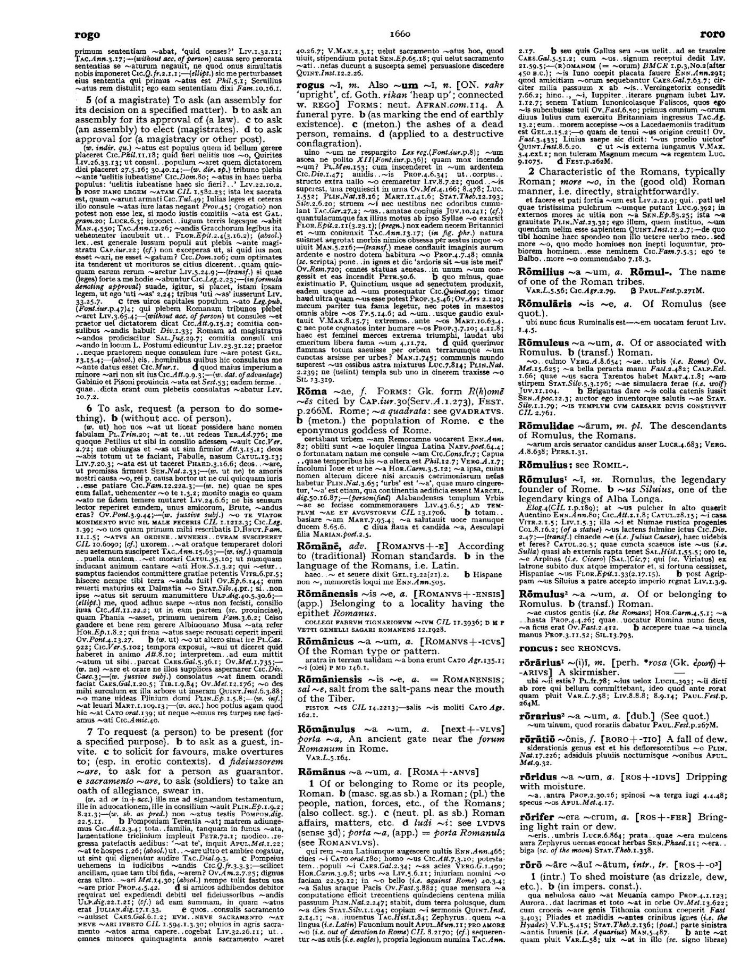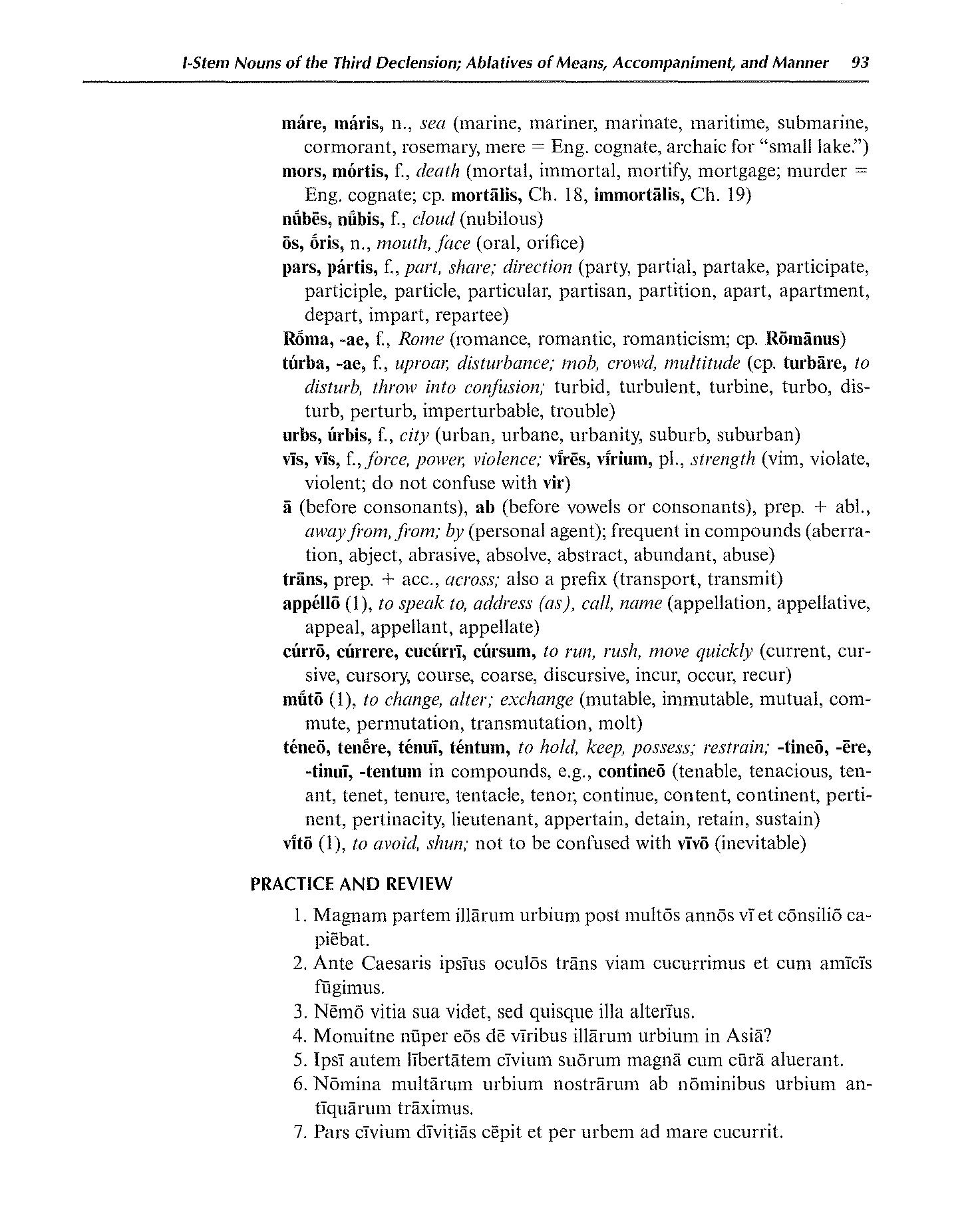
page_listing.tpl
page_subListingDetails.tpl
sub_listingDetails_style1.tpl
sub_listingDetails.title.tpl
Rōma Rome
Rōma is a Latin Noun that primarily means Rome.
Definitions for Rōma
Wheelock's Latin
Noun
- 1
Rome
English derivatives:
Romance romantic romanticism
Oxford Latin Dictionary
Noun
- 1
Rome (b) (meton.) the population of Rome. (c) the eponymous goddess of Rome.
Sentences with Rōma
Latin to English
Ut saepe fassī sumus, tibi nōn licet Rōmā Athēnās īre.Compare As we have often admitted, you may not (are not permitted to) go from Rome to Athens (lit., to go is not permitted to you).
Sī amīcīs eius Rōmae nocuissent, Rōmam brevissimō tempore redīsset.Compare If they had injured his friends at Rome, he would have returned to Rome in a very short time.
Rōmae antiquae erant quī pecūniam plūs quam rem pūblicam amārent.Compare At ancient Rome there were those who loved money more than the state.
Rōma vīsā, virī gaudēbant.Compare Rome having been seen, the men rejoiced.
Nōlī timēre nē omnēs virī et fēminae magnōrum animōrum Rōmā discēdant.Compare Do not fear that all the men and women of great courage will depart from Rome.
Roma interim crescio: duplico civis numerus.Compare Rome meantime increases: the number of citizens is doubled.
At Romae ruere in servitium consules, patres, eques: quanto quis illustrior, tanto magis falsi ac festinantes, vultuque composito, ne laeti excessus principis, neu tristiores primordio, lacrimas, gaudium, questus adulationem miscebant.Compare Meanwhile at Rome people plunged into slavery - consuls, senators, knights. The higher a man's rank, the more eager his hypocrisy, and his looks the more carefully studied, so as neither to betray joy at the decease of one emperor nor sorrow at the rise of another, while he mingled delight and lamentations with his flattery.
Forte consul redeo Roma. Is remedium timor sum.Compare It happened that the consul had returned to Rome. That was a remedy for their fear.
Data sources
Notes
- Definitions
- Frederick M. Wheelock, Wheelock's Latin, 6th ed., rev. Richard A. LaFleur (New York, NY: HarperCollins Publishers, 2005): 93.
- P. G. W. Glare, Oxford Latin Dictionary, Vols. 1-8 (Oxford: Clarendon Press, 1982): 1660.
- Word frequencies
- Paul B. Diederich, The Frequency of Latin Words and Their Endings, PhD diss., (Columbia University, 1939).
Bibliography
Allen, Joseph H. Allen and Greenough's New Latin Grammar for Schools and Colleges: Founded on Comparative Grammar. Edited by James B. Greenough, George L. Kittredge, Albert A. Howard, and Benjamin L. D'Ooge. Boston, MA: Ginn & Company, 1903.
Crystal, David. A Dictionary of Linguistics and Phonetics. 6th ed. Oxford, UK: Blackwell Publishing, 2008.
Delatte, Louis, Suzanne Govaerts, Joseph Denooz, and Etienne Evrard. Dictionnaire fréquentiel et index inverse de la langue latine [Frequency Dictionary and Inverse Index of the Latin Language]. Liège, Belgium: Laboratoire d'analyse statistique des langues anciennes de l'Université de Liège (L.A.S.L.A.), 1981.
Diederich, Paul B. The Frequency of Latin Words and Their Endings. PhD diss., Columbia University, 1939.
Francese, Christopher. "Latin Core Vocabulary." Dickinson College Commentaries. Last modified 2014. http://dcc.dickinson.edu/latin-vocabulary-list.
Gildersleeve, Basil L., and Gonzales Lodge. Gildersleeve's Latin Grammar: Third Edition, Revised, and Enlarged. 3rd ed. London, England: Macmillan and Co., 1903.
Glare, Peter G.W. Oxford Latin Dictionary. Vols. 1-8. Oxford, England: Clarendon Press, 1982.
Krüger, Bernd. "Latin Conjugation Tables." Cactus2000. Accessed May 5, 2023. https://latin.cactus2000.de/index.en.php.
Pierson, Nick. "Sound of Text." Accessed October 26, 2019. https://soundoftext.com.
Wheelock, Frederick M. Wheelock's Latin. 6th ed. Revised by Richard A. LaFleur. New York, NY: HarperCollins Publishers, 2005.
Wiktionary Contributors. "Victionarium." Wikimedia Foundation, Inc. Updated March 18, 2019. https://la.wiktionary.org/wiki/Victionarium:Pagina_prima.
Citation
Chicago (17th ed.)
Allo Contributors. "Rōma, Romae (n.) - Latin Word Definition." Allo Latin Dictionary. Last modified . Accessed February 19, 2026. http://ancientlanguages.org/latin/dictionary/roma-romae.
Entry created on . Last updated on .







